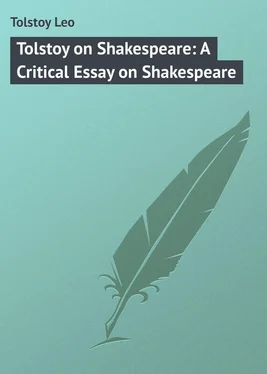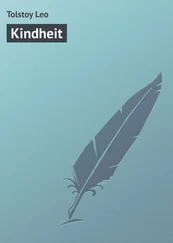Leo Tolstoy - Tolstoy on Shakespeare - A Critical Essay on Shakespeare
Здесь есть возможность читать онлайн «Leo Tolstoy - Tolstoy on Shakespeare - A Critical Essay on Shakespeare» — ознакомительный отрывок электронной книги совершенно бесплатно, а после прочтения отрывка купить полную версию. В некоторых случаях можно слушать аудио, скачать через торрент в формате fb2 и присутствует краткое содержание. Жанр: Русская классическая проза, foreign_language, на английском языке. Описание произведения, (предисловие) а так же отзывы посетителей доступны на портале библиотеки ЛибКат.
- Название:Tolstoy on Shakespeare: A Critical Essay on Shakespeare
- Автор:
- Жанр:
- Год:неизвестен
- ISBN:нет данных
- Рейтинг книги:5 / 5. Голосов: 1
-
Избранное:Добавить в избранное
- Отзывы:
-
Ваша оценка:
- 100
- 1
- 2
- 3
- 4
- 5
Tolstoy on Shakespeare: A Critical Essay on Shakespeare: краткое содержание, описание и аннотация
Предлагаем к чтению аннотацию, описание, краткое содержание или предисловие (зависит от того, что написал сам автор книги «Tolstoy on Shakespeare: A Critical Essay on Shakespeare»). Если вы не нашли необходимую информацию о книге — напишите в комментариях, мы постараемся отыскать её.
Tolstoy on Shakespeare: A Critical Essay on Shakespeare — читать онлайн ознакомительный отрывок
Ниже представлен текст книги, разбитый по страницам. Система сохранения места последней прочитанной страницы, позволяет с удобством читать онлайн бесплатно книгу «Tolstoy on Shakespeare: A Critical Essay on Shakespeare», без необходимости каждый раз заново искать на чём Вы остановились. Поставьте закладку, и сможете в любой момент перейти на страницу, на которой закончили чтение.
Интервал:
Закладка:
"O vain fool," says Goneril. "Thou changed and self-cover'd thing, for shame," continues the Duke:
"Be-monster not thy feature. Were't my fitness
To let these hands obey my blood,
They are apt enough to dislocate and tear
Thy flesh and bones; howe'er thou art a fiend,
A woman's shape doth shield thee."
After this a messenger enters, and announces that the Duke of Cornwall, wounded by his servant whilst plucking out Gloucester's eyes, had died. Goneril is glad but already anticipates with fear that Regan, now a widow, will deprive her of Edmund. Here the second scene ends.
The third scene of the fourth act represents the French camp. From a conversation between Kent and a gentleman, the reader or spectator learns that the King of France is not in the camp and that Cordelia has received a letter from Kent and is greatly grieved by what she has learned about her father. The gentleman says that her face reminded one of sunshine and rain.
"Her smiles and tears
Were like a better day; those happy smiles
That play'd on her ripe lip seem'd not to know
What guests were in her eyes; which parted thence,
As pearls from diamonds dropp'd."
And so forth.
The gentleman says that Cordelia desires to see her father, but Kent says that Lear is ashamed of seeing this daughter whom he has treated so unkindly.
In the fourth scene, Cordelia, talking with a physician, tells him that Lear has been seen, that he is quite mad, wearing on his head a wreath of various weeds, that he is roaming about and that she has sent soldiers in search of him, adding that she desires all secret remedies to spring with her tears, and the like.
She is informed that the forces of the Dukes are approaching, but she is concerned only about her father and departs.
The fifth scene of the fourth act lies in Gloucester's castle. Regan is talking with Oswald, Goneril's steward, who is carrying a letter from Goneril to Edmund, and she announces to him that she also loves Edmund and that, being a widow, it is better for her to marry him than for Goneril to do so, and she begs him to persuade her sister of this. Further she tells him that it was very unreasonable to blind Gloucester and yet leave him alive, and therefore advises Oswald, should he meet Gloucester, to kill him, promising him a great reward if he does this.
In the sixth scene, Gloucester again appears with his still unrecognized son Edgar, who (now in the guise of a peasant) pretends to lead his father to the cliff. Gloucester is walking along on level land but Edgar persuades him that they are with difficulty ascending a steep hill. Gloucester believes this. Edgar tells his father that the noise of the sea is heard; Gloucester believes this also. Edgar stops on a level place and persuades his father that he has ascended the cliff and that in front of him lies a dreadful abyss, and leaves him alone. Gloucester, addressing the gods, says that he shakes off his affliction as he can bear it no longer, and that he does not condemn them – the gods. Having said this, he leaps on the level ground and falls, imagining that he has jumped off the cliff. On this occasion, Edgar, soliloquizing, gives vent to a yet more entangled utterance:
"I know not how conceit may rob
The treasury of life when life itself
Yields to the theft; had he been where he thought,
By this had thought been past."
He approaches Gloucester, in the character of yet a different person, and expressing astonishment at the latter not being hurt by his fall from such a dreadful height. Gloucester believes that he has fallen and prepares to die, but he feels that he is alive and begins to doubt that he has fallen from such a height. Then Edgar persuades him that he has indeed jumped from the dreadful height and tells him that the individual who had been with him at the top was the devil, as he had eyes like two full moons and a thousand noses and wavy horns. Gloucester believes this, and is persuaded that his despair was the work of the devil, and therefore decides that he will henceforth despair no more, but will quietly await death. Hereupon enters Lear, for some reason covered with wild-flowers. He has lost his senses and says things wilder than before. He speaks about coining, about the moon, gives some one a yard – then he cries that he sees a mouse, which he wishes to entice by a piece of cheese. Then he suddenly demands the password from Edgar, and Edgar immediately answers him with the words "Sweet marjoram." Lear says, "Pass," and the blind Gloucester, who has not recognized either his son or Kent, recognizes the King's voice.
Then the King, after his disconnected utterances, suddenly begins to speak ironically about flatterers, who agreed to all he said, "Ay, and no, too, was no good divinity," but, when he got into a storm without shelter, he saw all this was not true; and then goes on to say that as all creation addicts itself to adultery, and Gloucester's bastard son had treated his father more kindly than his daughters had treated him (altho Lear, according to the development of the drama, could not know how Edmund had treated Gloucester), therefore, let dissoluteness prosper, the more so as, being a King, he needs soldiers. He here addresses an imaginary hypocritically virtuous lady who acts the prude, whereas and, saying this, Lear screams and spits from horror. This monolog is evidently meant to be addressed by the actor to the audience, and probably produces an effect on the stage, but it is utterly uncalled for in the mouth of Lear, equally with his words: "It smells of mortality," uttered while wiping his hand, as Gloucester expresses a desire to kiss it. Then Gloucester's blindness is referred to, which gives occasion for a play of words on eyes , about blind Cupid, at which Lear says to Gloucester, "No eyes in your head, nor no money in your purse ? Your eyes are in a heavy case, your purse in a light ." Then Lear declaims a monolog on the unfairness of legal judgment, which is quite out of place in the mouth of the insane Lear. After this, enter a gentleman with attendants sent by Cordelia to fetch her father. Lear continues to act as a madman and runs away. The gentleman sent to fetch Lear, does not run after him, but lengthily describes to Edgar the position of the French and British armies. Oswald enters, and seeing Gloucester, and desiring to receive the reward promised by Regan, attacks him, but Edgar with his club kills Oswald, who, in dying, transmits to his murderer, Edgar, Goneril's letter to Edmund, the delivery of which would insure reward. In this letter Goneril promises to kill her husband and marry Edmund. Edgar drags out Oswald's body by the legs and then returns and leads his father away.
"The fitchew nor the soiled horse goes to't
With a more riotous appetite.
All women inherit the gods only to the girdle
Beneath is all the fiend's" —
The seventh scene of the fourth act takes place in a tent in the French camp. Lear is asleep on a bed. Enter Cordelia and Kent, still in disguise. Lear is awakened by the music, and, seeing Cordelia, does not believe she is a living being, thinks she is an apparition, does not believe that he himself is alive. Cordelia assures him that she is his daughter, and begs him to bless her. He falls on his knees before her, begs her pardon, acknowledges that he is as old and foolish, says he is ready to take poison, which he thinks she has probably prepared for him, as he is persuaded she must hate him. ("For your sisters," he says, "have done me wrong: you have some cause, they have not.") Then he gradually comes to his senses and ceases to rave. His daughter suggests that he should take a walk. He consents and says: "You must bear with me. Pray you now forget and forgive: I am old and foolish." They depart. The gentleman and Kent, remaining on the scene, hold a conversation which explains to the spectator that Edmund is at the head of the troops and that a battle must soon begin between Lear's defenders and his enemies. So the fourth act closes.
Читать дальшеИнтервал:
Закладка:
Похожие книги на «Tolstoy on Shakespeare: A Critical Essay on Shakespeare»
Представляем Вашему вниманию похожие книги на «Tolstoy on Shakespeare: A Critical Essay on Shakespeare» списком для выбора. Мы отобрали схожую по названию и смыслу литературу в надежде предоставить читателям больше вариантов отыскать новые, интересные, ещё непрочитанные произведения.
Обсуждение, отзывы о книге «Tolstoy on Shakespeare: A Critical Essay on Shakespeare» и просто собственные мнения читателей. Оставьте ваши комментарии, напишите, что Вы думаете о произведении, его смысле или главных героях. Укажите что конкретно понравилось, а что нет, и почему Вы так считаете.












